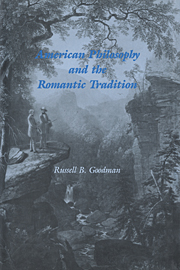Summary
A wise writer will feel that the ends of study and composition are best answered by announcing undiscovered regions of thought, and so communicating, through hope, new activity to the torpid spirit.
Ralph Waldo Emerson, Nature“The heart of pragmatism,” writes Hilary Putnam in The Many Faces of Realism – “of James's and Dewey's pragmatism, if not of Peirce's – was the insistence on the supremacy of the agent point of view. If we find that we must take a certain point of view, use a certain ‘conceptual system’, when we are engaged in practical activity, in the widest sense of ‘practical activity’, then we must not simultaneously advance the claim that it is not really ‘the way things are in themselves.’” To those who see Putnam's recent work as an important break with the Anglo-American tradition of which he has been so distinguished an exponent, such claims have something of a revolutionary air, by representing not simply a new sort of epistemological perspective but a renunciation as well, an admission that we are at last coming to the end of an older way of thinking about the mind and the world. Yet the identical claim has, as Putnam is perfectly aware, a venerable status in American philosophy, being in its way simply what William James said long ago in The Will to Believe, that as human beings we will accept no “philosophy whose principle is so incommensurate with our most intimate powers as to deny them all relevancy in universal affairs.”
- Type
- Chapter
- Information
- American Philosophy and the Romantic Tradition , pp. 125 - 129Publisher: Cambridge University PressPrint publication year: 1991



